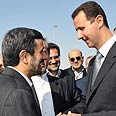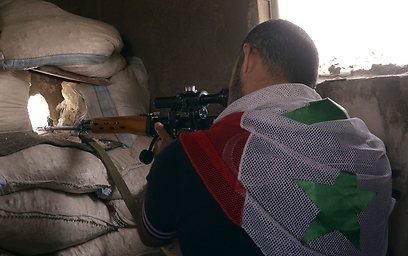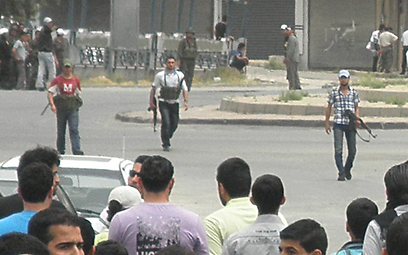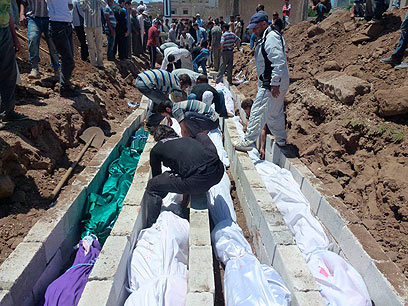
The discreet program has been described as an open secret in some areas loyal to President Bashar al-Assad, who is trying to crush a revolt against his family's four-decade hold on power.
Related stories:
- Syria criticizes Jordan for hosting rebel training
- Syrian opposition's print revolution
- Ya'alon on Syria: When it damages our interests - we'll respond
Reuters interviewed four fighters who said they were taken on the combat course in Iran, as well as opposition sources who said they had also been documenting such cases.

(Photo: Reuters)
Israel's intelligence chief and a Western diplomat have said Iran, Assad's main backer, is helping to train at least 50,000 militiamen and aims to increase the force to 100,000 - though they did not say where the training occurred.
No one at Iran's foreign ministry was available for comment, but Iranian officials have repeatedly denied military involvement in the Syrian conflict, saying they have only provided humanitarian aid and political support for Assad.
A Syrian government security source, who declined to be named, denied that Syria was sending fighters to Iran. "We train our own special forces for this type of combat," he said. "Since 2006 we have had units trained in guerrilla warfare, why would we need to send people to Iran?"

(Photo: AP)
But if the reports by Syrian fighters are true, the move to train combatants in Iran suggests that their country's increasingly regionalized conflict has grown well beyond - and could even outlast - a battle for power between Assad's circle and the opposition.
The fighters also appear to come largely from minority groups that have supported Assad against the mostly Sunni Muslim-led uprising. Such a move could exacerbate the dangerous sectarian dimensions of a conflict that has turned into a civil war that has cost the lives of more than 70,000 people.
Iran, a Shi'ite rival to Sunni countries in the Gulf that support the rebels, sees Syria as the lynchpin of its regional influence. Syria has been its conduit to the Lebanese guerrilla movement Hezbollah , which fought a war with Israel in 2006.
"It was an urban warfare course that lasted 15 days. The trainers said it's the same course Hezbollah operatives normally do," said Samer, a Christian member of a pro-Assad militia fighting in rural parts of Homs province in central Syria.
"The course teaches you the important elements of guerrilla warfare, like several different ways to carry a rifle and shoot, and the best methods to prepare against surprise attacks."
According to fighters interviewed in Homs, most men sent to undergo the training are from the Alawite sect, the heterodox strain of Shi'ite Islam of which Assad himself is a member.
A smaller number were Druze and Christians, whose communities are divided but largely support Assad due to their fears of rising Islamist rhetoric among the opposition.
"The Iranians kept telling us that this war is not against Sunnis but for the sake of Syria. But the Alawites on the course kept saying they want to kill the Sunnis and rape their women in revenge," said Samer.

(Photo: Reuters)
Iran has supported and helped train Syria's army under long-standing military cooperation agreements, but a push into training its paramilitary forces could aggravate regional rivals such as Israel, which is particularly wary of Syrian groups increasing coordination with Hezbollah , or Saudi Arabia.
"If the Saudis felt that the Iranians are really moving this game up, they will be sure to check that escalation by increasing assistance to rebel fighters," said Michael Stephens, a Doha-based analyst for the security think tank RUSI.
"Saudi Arabia is totally focused on this as a way to make the Iranians bleed ... keep the Iranians bogged down in this proxy war, bleed them dry."
The fighters described the training as far superior to skills they had been taught in courses inside Syria.
"Before I could only hit targets 50 percent of the time, now I can hit a target around 90 percent of the time," said Samer.
"In Syria, they made the priority defending the place we are in, no matter the price. In Iran, they told us to save our lives. If you lose the position but survive, you can recoup and regain the site another day. If you die, your position will eventually be lost."
- Receive Ynetnews updates
directly to your desktop















